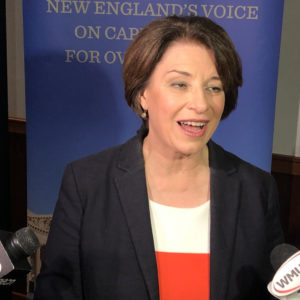The same day coal miners gathered in Washington, D.C. to ask President Donald Trump and 2020 Democratic presidential candidates to save their jobs and pensions, 2020 Democrats touted their climate change policies at the CNN Town Hall, many of which would eliminate coal jobs without providing a replacement.
“We believe young people working in the mines should have a future, which by the way, if you live in Appalachia, are the best jobs in Appalachia,” United Mine Workers of American President Cecil Roberts said at a National Press Club event this week. “People are constantly saying, ‘Well, we’re just going to do away with these jobs.’ These miners have families at home. Retirees have pensions at risk. Most of them in Appalachia are worried about this ongoing debate. It’s hard for coal miners to have a voice in this country because many people look down their nose at us, what in the world could someone who mines coal have to say? And some people think maybe we should keep our mouth shut and get out of the way.”
The top 2020 Democratic candidates have released their climate change policies, and most of them say nothing about the coal industry or how to transition coal miners into new green jobs. The three candidates that do offer some kind of job transition for coal miners are former Housing Secretary Julian Castro, Sen. Bernie Sanders (I-Vt.) and Sen. Elizabeth Warren (D-Mass.). (Sanders and Warren also cosponsored the American Miners Act, which would protect miners’ pensions, which Roberts said is a top priority for UMWA.)
Sen. Amy Klobuchar (D-Minn.) has long touted her support for miners, but has not signed onto the American Miners Act. At the CNN Town Hall, she reiterated her support for mine workers and moderate stance on climate change.
“I see natural gas as a transitional fuel. It is better than oil, but it’s not nearly as good as wind and solar,” she said.
Klobuchar pledged not to take money from the fossil fuel industry for her campaign, but according to data from Open Secrets, she takes thousands of dollars from at least one natural gas utility, Xcel Energy. She is also ranked No. 4 on Open Secrets’ Top 20 list of U.S. senators taking money from the fossil fuel industry during the 2020 election cycle.
She also pushed back on Castro’s, Sanders’ and Warren’s plans, all of which echo the Green New Deal (Sanders also calls his plan a ‘Green New Deal’), arguing that blue-collar workers like coal miners won’t vote for them if they stick to such hardline plans to eliminate fossil fuel jobs (even though the three of them have plans to transition coal miners into green energy jobs).
“It’s going to be really hard to bring along those people who we need to win in the middle of the country,” she said.
But Klobuchar hasn’t announced a plan for helping coal miners keep their pensions or their jobs, which Trump has promised to do. Coal miners all over the U.S. who voted Democrat until 2016 still hope he will deliver on that promise.
UMWA invited all the 2020 Democratic presidential candidates to go underground and meet and talk with coal miners, but a spokesperson told InsideSources that no one has followed through, yet.
Mayor of New York City Bill de Blasio and Beto O’Rourke both canceled their planned trips to go underground with UMWA, but UMWA told InsideSources they are “working to reschedule” with O’Rourke. Joe Biden and Sanders have not confirmed plans, yet, and Sen. Kamala Harris (D-Calif.) and Warren “thanked us for the invite, nothing since.”
For coal miners, these attitudes, stances and responses all but confirm their wariness about 2020 Democrats.
Sanders, who announced his $16 trillion Green New Deal a few weeks ago (which is a much less expensive plan than AOC’s Green New Deal), plans to transition coal miners into green energy and infrastructure jobs, and met with coal miners after he announced his plan. Sanders says his plan will create 20 million jobs and pay for itself by jumpstarting a new era of green economic activity.
The question is, could Sanders’ Green New Deal give miners better jobs without bankrupting America? Coal miners say it’s “almost impossible.”
Some economists say no, others say maybe, and most say its timeline is far too ambitious — Sanders wants to reach complete renewable energy by 2030 and complete decarbonization by 2050 “at the latest.”
Aparna Mathur, a resident scholar specializing in economic policy and labor issues at the American Enterprise Institute (AEI), thinks a carbon tax could pay for the Green New Deal, but her plan doesn’t work in Sanders’ timeline (a carbon tax could reduce emissions by 30 percent by 2050).
According to a report from the Economic Policy Institute, massive infrastructure investments — like the one Sanders plans as part of his Green New Deal — can accelerate job growth and economic activity in the long term, but there isn’t a reliable way to determine whether they would “pay off” or “pay for themselves” long term (like Sanders claims they will).
“A debt-financed package of green investments totaling $92 billion annually boosts GDP by $147 billion and generates 1.1 million net new jobs by the end of the first year, with the increased levels then sustained over the next decade,” Director of Research Josh Bivens said.
But it’s impossible to predict labor demand in the long term from a project like the Green New Deal.
For now, coal miners remain skeptical.
“What happens as the market continues to shrink? We’ve needed a transition for some 20 years now, and no one has offered one up, but everyone has one now,” Roberts said at the National Press Club event. “When people say all we need is more Democrats, well, we’ve been down this road, and this failed.”

